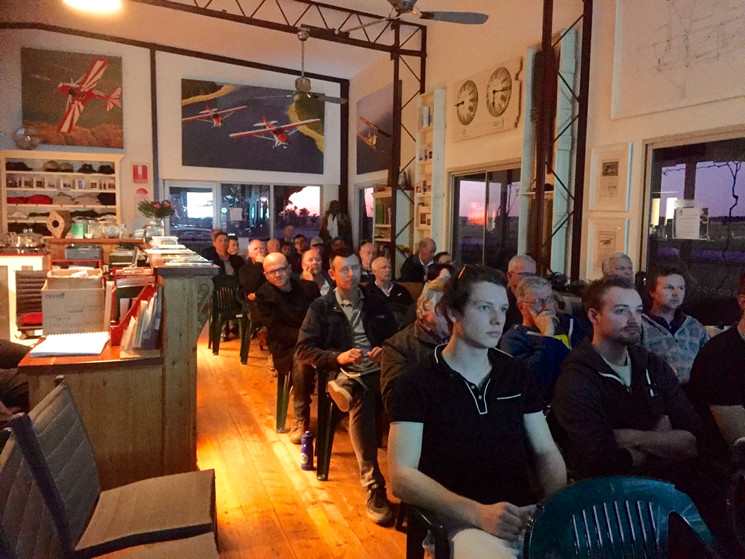Rob Whittle is stepping into some big shoes when he conducts the Civil Aviation Safety Authority’s AvSafety seminars in Murwillumbah in northern New South Wales.
The airfield is named after Rob’s namesake, Bob Whittle (no relation), a decorated fighter pilot who came home after World War II to help form the local aero club as an instructor in 1946.
The younger Whittle may not be a decorated war veteran, but his aim is the same: to educate pilots and help them develop their skills.
He also has plenty of experience, starting his aviation career as a contract airways data systems officer and working as a part-time instructor and charter pilot when off shift.
He worked in roles including airline operations controller, airline crewing officer and commercial pilot before joining the Queensland Police.
In an 18-year police career, he was a forensic crash investigator, scenes-of-crimes officer and remotely piloted aircraft systems (RPAS) chief pilot before joining CASA.
He is one of up to nine CASA aviation safety advisors (ASAs) who travel around Australia throughout the year to present the well-regarded AvSafety seminars in major cities and the regions.
From Murwillumbah to Albany and Townsville, the experts give aviation, engineering and flight instructor safety workshops in hangars, clubs rooms and other venues.
Despite the impact of COVID-19, CASA still conducted 175 face-to-face aviation safety seminars last year and 578 on-site visits by ASAs, to reach 5,250 industry members around the country.

Murwillumbah, in the scenic Tweed region, regularly plays host to AvSafety seminars and Rob Whittle conducted the most recent event on 31 January.
‘We really welcome them,’ Murwillumbah Aero Club secretary Bruce Gard says. ‘Everybody who comes along seems very positive in that they always learn something.
‘A percentage of them are older, experienced pilots and we have members ranging from those who have just done their PPL or CPL, right through to airline pilots who have 20,000 plus hours.’
The current seminar topic, ‘Pushing the envelope?’, explores general competency, fatigue and distractions, runway incursions and go-arounds.
Gard says even the experienced pilots pick up something from the seminars and the incidents and accidents used to illustrate them.
‘I picked up some things about decision-making and fatigue, which I found interesting,’ he adds.
It also gives the locals an opportunity to interact with CASA and Gard advises all pilots to take advantage of that opportunity when the seminars arrive in their area.
‘We have a little supper afterwards and then get to mix with Rob and other members and ask questions about different things,’ he says. ‘It certainly is beneficial.’
Whittle is off next to Queensland with seminars in Cairns, Townsville and Atherton.
‘The aim of these safety seminars is to help improve safety by raising pertinent points and to provide a really good, healthy reminder of some things that might have been forgotten, depending on how long ago flight training and theory was done,’ he says.
‘Last year it was weather. This year it’s more on fatigue and distractions, general competency, runway incursions and go-arounds and pushing your own limits.
‘We talk about human factors and we also talk about fatigue and how that can affect your flying as well as the danger of distractions. We look at distractions and how they can impact pilots while you’re taxiing on the ground and distractions also while you’re flying.
‘They could be anything really: distractions because you’re tired, or passenger distractions – the passengers may be talking to you, and you may miss something.
‘There are also distractions with your cockpit management. The paperwork you’re doing inside the cockpit, your flight administration, can be a distraction.’
The seminars cater for both rotary operations and fixed-wing pilots and drone operators have also been known to attend to get a better feel for crewed aviation.
Whittle says the events attract a wide range of pilots but he would like to see greater representation from pilots who have their commercial licence and students who are starting their career in the industry.
‘It’s a really good environment because we do get to interact with the attendees, and you get a range of people attending, some of whom are extremely experienced, and the younger or less experienced pilots can learn from them,’ he says.
‘They can have a talk to them and also us, before and after the seminar, have a good social experience, learn something and get some contacts.’
Some pilots tell the ASAs that the seminars jog their memories about issues they may have forgotten while others say they the experience raises their awareness.
‘Sometimes it’s more of an awareness of the rules, sometimes it’s more of an awareness of their own personal human factor elements that may affect their flying,’ Whittle says.
‘We have checklists they can use personally and that they can apply to flight plan better and just to make sure that they are fit to fly, and they are going to fly safely.’
The COVID-19 pandemic has led to an online move for AvSafety seminars and Whittle was pleased to see more than 70 people recently sign up for a virtual seminar on the current topic.
He says the virtual events allow people to dial in. ‘It doesn’t matter where you are in Australia, it’s open to everyone,’ he says.
People can find out about the seminars on social media and they are also advertised on the CASA website. Registration is through EventBrite and attendance is free.
Also see Standing up for safety
.


